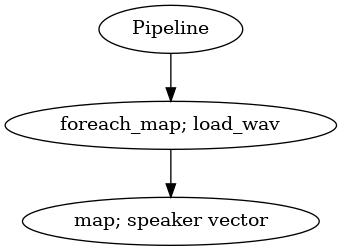Speaker Vector
Contents
Speaker Vector#
This tutorial is available as an IPython notebook at malaya-speech/example/speaker-vector.
This module is language independent, so it save to use on different languages. Pretrained models trained on multilanguages.
This is an application of malaya-speech Pipeline, read more about malaya-speech Pipeline at malaya-speech/example/pipeline.
[1]:
import os
os.environ['CUDA_VISIBLE_DEVICES'] = ''
[2]:
from malaya_speech import Pipeline
import malaya_speech
import numpy as np
`pyaudio` is not available, `malaya_speech.streaming.stream` is not able to use.
[3]:
import logging
logging.basicConfig(level=logging.INFO)
List available deep model#
[4]:
malaya_speech.speaker_vector.available_model()
INFO:malaya_speech.speaker_vector:tested on VoxCeleb2 test set. Lower EER is better.
INFO:malaya_speech.speaker_vector:download the test set at https://github.com/huseinzol05/malaya-speech/tree/master/data/voxceleb
[4]:
| Size (MB) | Quantized Size (MB) | Embedding Size | EER | |
|---|---|---|---|---|
| deep-speaker | 96.7 | 24.40 | 512.0 | 0.21870 |
| vggvox-v1 | 70.8 | 17.70 | 1024.0 | 0.13944 |
| vggvox-v2 | 43.2 | 7.92 | 512.0 | 0.04460 |
| conformer-base | 99.4 | 27.20 | 512.0 | 0.06938 |
| conformer-tiny | 20.3 | 6.21 | 512.0 | 0.08687 |
Smaller EER the better model is.
Load deep model#
def deep_model(model: str = 'vggvox-v2', quantized: bool = False, **kwargs):
"""
Load Speaker2Vec model.
Parameters
----------
model : str, optional (default='speakernet')
Check available models at `malaya_speech.speaker_vector.available_model()`.
quantized : bool, optional (default=False)
if True, will load 8-bit quantized model.
Quantized model not necessary faster, totally depends on the machine.
Returns
-------
result : malaya_speech.supervised.classification.load function
"""
[4]:
model = malaya_speech.speaker_vector.deep_model('conformer-base')
2023-01-27 23:13:07.304958: I tensorflow/core/platform/cpu_feature_guard.cc:142] This TensorFlow binary is optimized with oneAPI Deep Neural Network Library (oneDNN) to use the following CPU instructions in performance-critical operations: AVX2 FMA
To enable them in other operations, rebuild TensorFlow with the appropriate compiler flags.
2023-01-27 23:13:07.314286: E tensorflow/stream_executor/cuda/cuda_driver.cc:271] failed call to cuInit: CUDA_ERROR_NO_DEVICE: no CUDA-capable device is detected
2023-01-27 23:13:07.314317: I tensorflow/stream_executor/cuda/cuda_diagnostics.cc:169] retrieving CUDA diagnostic information for host: husein-MS-7D31
2023-01-27 23:13:07.314322: I tensorflow/stream_executor/cuda/cuda_diagnostics.cc:176] hostname: husein-MS-7D31
2023-01-27 23:13:07.314421: I tensorflow/stream_executor/cuda/cuda_diagnostics.cc:200] libcuda reported version is: Not found: was unable to find libcuda.so DSO loaded into this program
2023-01-27 23:13:07.314615: I tensorflow/stream_executor/cuda/cuda_diagnostics.cc:204] kernel reported version is: 470.161.3
[16]:
from glob import glob
speakers = ['speech/example-speaker/khalil-nooh.wav',
'speech/example-speaker/mas-aisyah.wav',
'speech/example-speaker/shafiqah-idayu.wav',
'speech/example-speaker/husein-zolkepli.wav'
]
Pipeline#
[17]:
def load_wav(file):
return malaya_speech.load(file)[0]
p = Pipeline()
frame = p.foreach_map(load_wav).map(model)
[18]:
p.visualize()
[18]:

[19]:
r = p(speakers)
Calculate similarity#
[20]:
from scipy.spatial.distance import cdist
1 - cdist(r['speaker-vector'], r['speaker-vector'], metric = 'cosine')
[20]:
array([[ 1. , -0.40519101, -0.35340283, 0.41143028],
[-0.40519101, 1. , 0.49214888, -0.43672686],
[-0.35340283, 0.49214888, 1. , -0.27411077],
[ 0.41143028, -0.43672686, -0.27411077, 1. ]])
Remember, our files are,
['speech/example-speaker/khalil-nooh.wav',
'speech/example-speaker/mas-aisyah.wav',
'speech/example-speaker/shafiqah-idayu.wav',
'speech/example-speaker/husein-zolkepli.wav']
